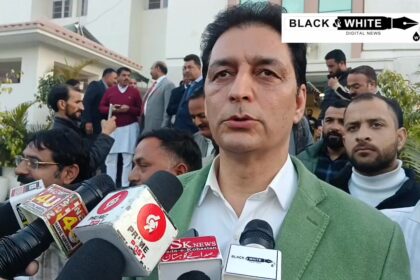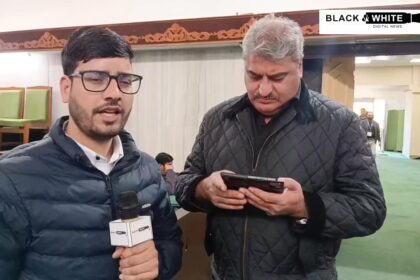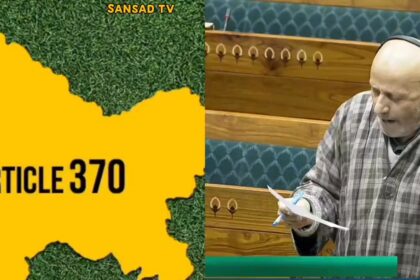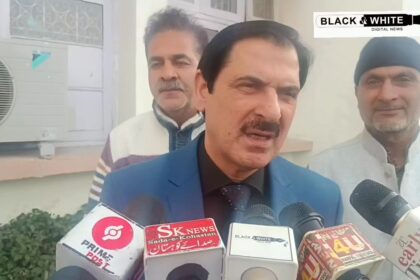||Black and White Digital News||
||November 05, 2024||
KASHMIR: The inaugural session of the newly elected Jammu and Kashmir Assembly erupted into an intense debate, as People’s Democratic Party (PDP) legislator Waheed Para introduced a resolution advocating for the restoration of Article 370, sparking sharp exchanges across party lines. The resolution, which calls for the reinstatement of Jammu and Kashmir’s special status, quickly became a flashpoint, leading to a vociferous standoff between the PDP and members of the Bharatiya Janata Party (BJP).
Para, who represents the Pulwama constituency, underscored the PDP’s stance against the 2019 abrogation of Article 370, which previously granted autonomy to the region. His move was met with vehement opposition from BJP members, who demanded that the resolution be struck down immediately and any related comments expunged from the Assembly records. The session, meant to serve as a platform for constructive dialogue, devolved into an uproar as members sparred over the implications of revisiting the Article 370 decision.
PDP leader Mehbooba Mufti publicly lauded Para’s action, calling it a brave step. In a post on the social media platform X (formerly Twitter), Mufti expressed her pride in Para’s initiative: “Proud of Waheed Parra for introducing a resolution in the JK Assembly opposing the revocation of Article 370 and resolving to restore the special status. God bless you.” Her remarks fueled further debate, as critics saw this as a calculated move to appeal to PDP’s support base.
Meanwhile, Omar Abdullah, Chief Minister of Jammu and Kashmir and leader of the National Conference (NC), criticized the resolution as a superficial gesture lacking genuine intent. Abdullah, who has often emphasized the need for a united approach to address the region’s issues, suggested that the PDP’s unilateral move to introduce the resolution was purely symbolic and designed to attract media attention. “We were aware that preparations for this were being made by a member,” Abdullah said. “The reality is that the people of Jammu and Kashmir do not support the decision taken on August 5, 2019. If they had, the results today would have been different. The House will not be directed by any single member. The resolution brought forth today holds no significance and is merely for the cameras. Had there been a genuine purpose, discussions would have occurred with us prior to this.”
The Opposition leader, Sunil Sharma, sharply criticized the move, labeling it an “anti-youth agenda” by the NC-PDP coalition. According to Sharma, the persistence of parties like the PDP and NC in resurrecting issues around Article 370 diverts attention from youth-centric policies that would promote economic growth, education, and employment for Jammu and Kashmir’s younger generation. Sharma argued that the agenda displayed by the coalition focuses more on “reviving obsolete policies” instead of prioritizing development and progress for the state’s youth. He further asserted that by pushing a “regressive” agenda, the NC-PDP coalition fails to recognize the aspirations of young Kashmiris who seek opportunities within a unified and progressive India.
Article 370: A Continuing Political Battle
The restoration of Article 370 and the autonomy of Jammu and Kashmir have remained crucial issues for the NC and PDP, which both included these demands prominently in their election manifestos. The abrogation of Article 370 on August 5, 2019, led to the region being reclassified as a Union Territory, a change that provoked intense political and public reactions. Since then, restoring Jammu and Kashmir’s statehood, along with the re-establishment of special status, has become a central pillar of the NC-PDP agenda.
However, the BJP has consistently opposed any reversal of the Article 370 abrogation, arguing that the move was essential to bring Jammu and Kashmir fully into the fold of the Indian Union, ensuring equality under the Constitution and promoting stability in the region. BJP representatives have stressed that restoring Article 370 would mark a setback for Jammu and Kashmir, deterring investment and halting its integration into India’s broader economic and governance structures.
Assembly’s Inaugural Session and the Road Ahead
The Assembly session, set to conclude on November 8, was expected to be a crucial moment for the new legislature to tackle the immediate needs of Jammu and Kashmir, including statehood restoration, developmental issues, and youth programs. However, the sudden controversy over the Article 370 resolution has overshadowed these objectives.
The Assembly’s agenda includes the Lieutenant Governor’s address and the paying of obituary tributes to legislators who have passed away since the last session in 2019. Observers note that the reintroduction of the Article 370 issue has likely derailed meaningful discussions on state development, economic reforms, and other pressing issues.
As the session progresses, analysts believe the uproar witnessed in the Assembly may persist, with each party defending its stance on Article 370 in the hope of securing support from different demographic groups in Jammu and Kashmir.
Leave a comment
You Might Also Like
MLA Shakti Parihar Says Every Legislator Highlighted Development Issues of Their Respective Constituencies While Discussing Grants
MLA Shakti Parihar Says Every Legislator Highlighted Development Issues of Their Respective Constituencies While Discussing Grants
0 Min Read
Exclusive Conversation With Mla Banihal Gool Sajjad Shaheen
Exclusive Conversation With Mla Banihal Gool Sajjad Shaheen
0 Min Read
Article 370 Hum Wapis Lekar Rehege Aapko Wapis Krna He Hoga MP Er Rashid
Article 370 Hum Wapis Lekar Rehege Aapko Wapis Krna He Hoga MP Er Rashid
0 Min Read
Mir Saifullah MLA Tregham Ne Kaha National Conference Koshish Kar Rahi Hai Logon K Issues Hal Kiye Jaye
Mir Saifullah MLA Tregham Ne Kaha National Conference Koshish Kar Rahi Hai Logon K Issues Hal Kiye Jaye
0 Min Read









